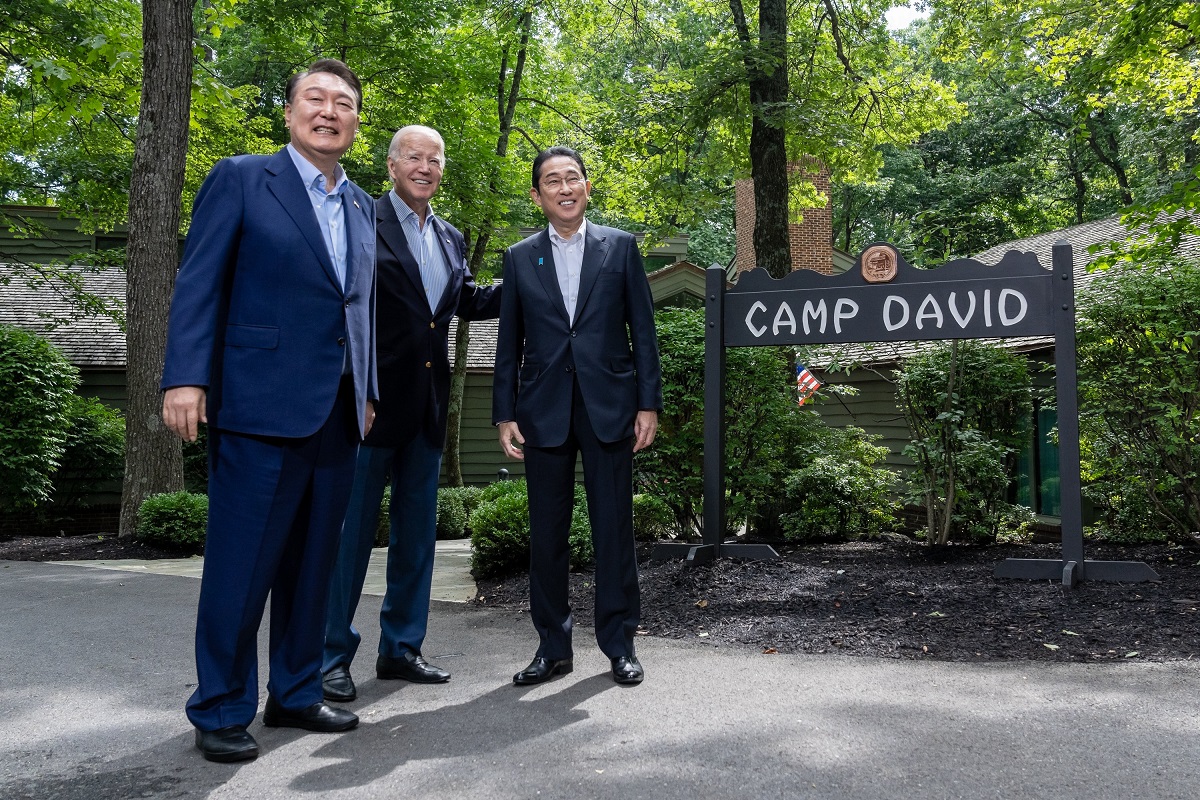Washington, Seoul and Tokyo together against 'common threats'. Beijing: 'hypocritical mini-NATO'
At first trilateral summit held at Camp David set up consultation mechanism and annual joint military exercises. But the cooperation sought by Yoon and Kishida will now face the political test of Fukushima: Tokyo is expected to announce any day now the date for the release into the ocean of cooling water from the nuclear plant, opposed by public opinion in Seoul.
Washington (AsiaNews / Agencies) - A mechanism for immediate consultation in the event of common threats, annual joint military exercises and cooperation to strengthen missile defense against North Korea.
These are the security agreements reached yesterday in the first trilateral summit between US President Joe Biden, South Korean President Yoon Suk Yeol and Japanese Prime Minister Fumio Kishida at Camp David in Maryland.
The spotlights from all over the world were focused on this appointment since it was the first time that the leaders of the three countries had met for a separate meeting, not on the sidelines of an international summit.
Undoubtedly, this is the result of a rapprochement between Seoul and Tokyo, strongly promoted by Washington to contain Chinese expansionism in the Asia-Pacific area.
But this new context has yet to contend with public discontent in two countries for the wounds of the past but also for a very hot current issue, such as Japan's intention to proceed in the coming weeks with the release of containment water from the nuclear power plant of Fukushima, seen as a serious threat by South Korean fishermen.
The three leaders yesterday defined the agreement formalized in a short document called "Consultation commitment between Japan, the Republic of Korea and the United States" as "historic" and which - without naming them - looks at the economic and security challenges posed by Korea from the North and from China.
“Through these consultations, we intend to share information, align our messages and coordinate response actions,” the document reads. Which, however, reserves to each of the countries "the freedom to undertake all appropriate actions to support their security interests or sovereignty", underlining that the commitment does not replace any obligation established by the treaties of alliance between South Korea and the United States or between the United States and Japan, nor does it give rise to any right or obligation under international or national law.
The three countries pledged to pursue increased cooperation on ballistic missile defense to counter North Korea's nuclear and missile threats and agreed to set up a new trilateral working group to combat Pyongyang's cyber threats and block the avoidance of sanctions by the latter.
In the joint summit statement the United States, Japan and South Korea express concerns over China's "dangerous and aggressive behavior in support of illegal maritime claims" in the South China Sea. "We strongly oppose any unilateral attempt to change the status quo in Indo-Pacific waters," the statement continued, adding that leaders reaffirmed the importance of peace and stability across the Taiwan Strait.
As for "economic security," the three sides agreed to cooperate on supply chain resilience, particularly on semiconductors and batteries, but also clean energy. They also agreed to strengthen cooperation to prevent their cutting-edge technologies from being illegally exported or copied overseas.
As expected, Beijing's reaction was harsh: the semi-official English-language newspaper Global Times speaks of the birth of a "mini-NATO" at the service of "a hypocritical anti-Chinese pantomime".
"Asia-Pacific is a region of peace and development and a land of cooperation that must not become an arena for geopolitical games," Chinese Foreign Ministry spokesman Wang Wenbin said on the eve of the Camp David summit. While the already planned air and naval exercises of the People's Liberation Army around Taiwan began today, expressly defined as "a warning to the independence supporters of Taipei".
However, the solidity of the cooperation between Tokyo and Seoul remains to be verified and an important test will be the affair on the waters of Fukushima. Tomorrow, on his return from the United States, Japanese premier Kishida will visit the site of the nuclear power station that was the scene of the 2011 accident.
According to Japanese government sources, the Tokyo government could already decide on the date for the release into the sea on Tuesday 22 August. cooling waters which, according to the plan approved last month by the International Atomic Energy Agency, would not represent a danger to people and the environment.
Photo: Official White House X account







.png)










